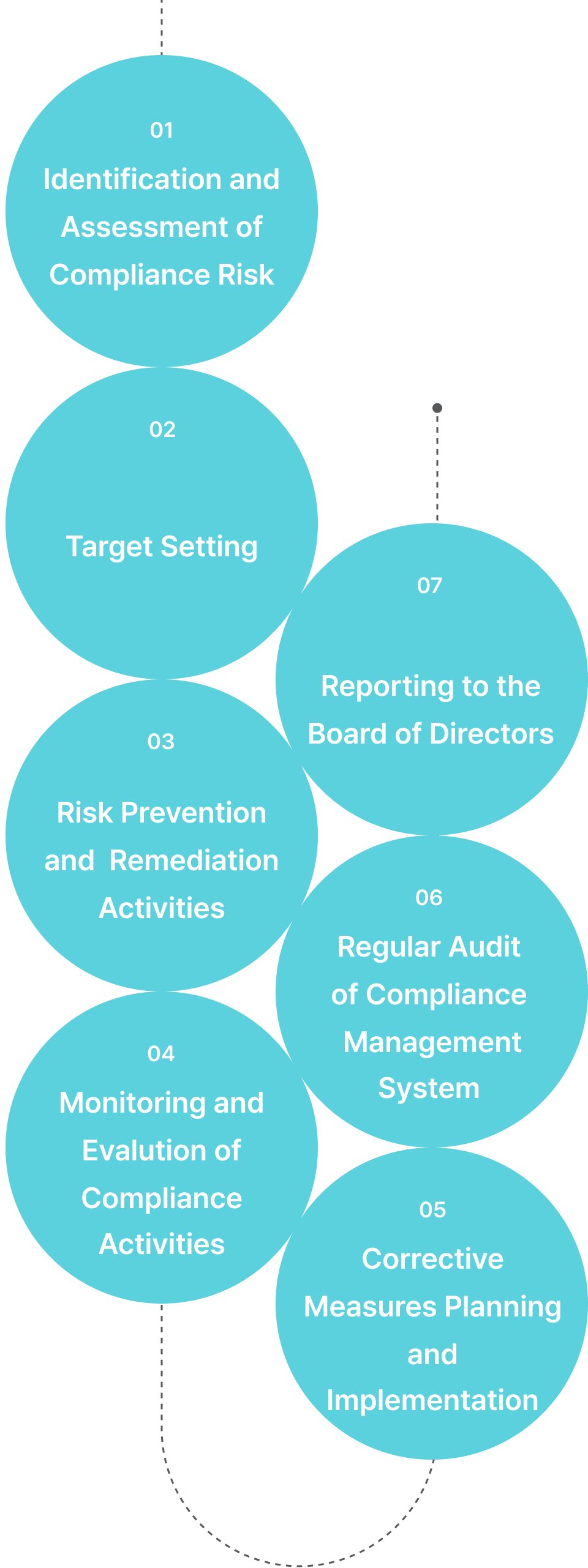Governance
Compliance Management
LG Energy Solution operates compliance control regulation and compliance management system (CMS) to identify and prevent compliance risks in major areas related to business activities such as fair trade, product quality, environment and safety, information security, and anti-corruption.
Compliance Governance
A compliance officer, designated by the Board of Directors, is responsible for overseeing compliance controls and monitoring the company-wide compliance management system. The compliance officer is mandated to report, biannually, to the Board of Directors and its ESG Committee on the progress of key compliance risks control, improvement plan and key findings from regular audits of effectiveness of the CMS to ensure the CMS meets evolving requirements of global standards and customers’ demands.
Key roles and responsibilities of
a Compliance Officer include
-
1
Monitoring compliance controls on a regular / ad-hoc basis and reporting key findings to the Board of Directors
-
2
Providing training and education to employees to promote awareness and understanding of compliance obligations
-
3
Identifying and assessing legal and compliance risks
-
4
Handling non-compliance cases from identification of non-compliance, consultation to advising on the appropriate actions
-
5
Executing disciplinary actions for employee non-compliance
Compliance Management System(CMS)
LG Energy Solution’s Compliance Management System (CMS) is a comprehensive framework that enables to effectively identify and address global legal and regulatory requirements and risks in key areas relevant to our global business, as well as monitor and manage compliance activities within LG Energy Solution and its operating sites. These areas include fair trade, product quality, environment and safety, information security, and anti-corruption. The CMS is overseen by the Compliance Team under Compliance Officer’s leadership, in collaboration with relevant departments. In 2023, LG Energy Solution launched a ‘Compliance Portal’ within its intranet, to enhance the systematic management of compliance control activities carried out by each and every relevant department. The Portal serves as a centralized database to document and track all activities and facilitates effective monitoring and performance management.
In November 2021, LG Energy Solution became the first company in the global battery industry to obtain ISO 37301, an international certification for the establishment of a global compliance management system. Going forward, the company will continue to enhance transparency and trust with customers and various stakeholders, while strengthening its competitive edge in the field of global compliance management.
CMS-based Compliance Risk Management Process
LG Energy Solution's Compliance Management System (CMS) identifies and evaluates compliance risks every year and establishes compliance goals to address and prevent them. They monitor violations and/or illegal activities and carry out evaluations to continuously improve CMS.

-
Identification and Assessment of Compliance Risk
This step involves close and continuous monitoring of regulatory and policy landscape in relevant countries to identify potential compliance risk that may arise in our daily business operations. Once potential risks are identified, we assess the current level of compliance with relevant regulations. Based on the assessment, key risks are defined to prioritize compliance activities.-
Compliance Management Areas
Compliance management areas include, but not limited to, fair trade, environment and safety, product quality, intellectual property, information security, human resources management (including sexual and non-sexual harassment), trade and customs, foreign exchange, tax, and anti-corruption.
-
-
Target Setting
The next step is to establish targets and measures to prevent the risks identified and assessed in the previous step. By risk area, relevant departments are responsible for setting quantitative targets, timeline and appropriate compliance activities in relation to their respective roles. -
Risk Prevention and Remediation Activities
Activities range from development and/or revision of company policies, regulations, manuals and relevant guidelines, training and education, progress monitoring, to IT system development and improvement. -
Monitoring and Evalution of Compliance Activities
This step aims to monitor and evaluate potential non-compliance activities that may arise in assuming the roles of relevant departments. Based on key findings from monitoring and evaluation, root cause analysis and improvement planning follows. -
Corrective Measures Planning and Implementation
The analysis of root cause and area of improvement informs planning of corrective measures. The concrete plans are established and implemented in coordination across relevant departments and/or with monitoring department. -
Regular Audit of Compliance Management System
The CMS are audited on a regular basis to ensure continuous improvement. The regular audit is designed to evaluate the relevance and effectiveness of risk prevention measures, compliance trainings, and progress made in achieving the targets. -
Reporting to the Board of Directors
As the highest decision-making body within LG Energy Solution, the Board of Directors (BoD) plays a crucial role in overseeing compliance matters. In accordance with the Korean Commercial Law, the BoD has the authority to appoint a Compliance Officer and must be informed about key compliance issues regularly to make relevant decisions. In accordance with LG Energy Solution's ESG Committee Regulation, the ESG Committee under the BoD assumes the role of supervision of the company-wide compliance management. It facilitates and formalizes active engagement of BoD in compliance issues and continuous improvement of the CMS.
Corruption Risk Management
In order to enhance transparency and foster trust among our stakeholders, LG Energy Solution is committed to effectively managing and mitigating the risks associated with corruption and bribery.
LG Energy Solution strictly prohibits corruption or bribery in any form. We uphold these principles with unwavering commitment and undertake various measures to effectively manage corruption risks through our Compliance Management System.
To ensure the compliance, we conduct close monitoring of legislative revisions and new enactments, as well as policy and regulatory landscape in relevant authorities. We assess legal and regulatory requirements and identify any potential or actual risk and control measures on a continuous basis. The control measures are also regularly monitored and evaluated to identify areas for improvement to ensure their effectiveness.
LG Energy Solution takes a comprehensive approach to managing corruption and bribery risks, specifically through establishment and implementation of an Anti-Bribery Policy, operational rules, guidelines, and checklists. We continuously review and manage these ethical standards to ensure they are in compliance with laws and regulations in all applicable jurisdictions, as well as global standards. The update and revision of our ethical standards is made taking into account the results from the review and audit. All employees at LG Energy Solution are required to sign the "Pledge of Compliance with Bribery Prevention Acts" and complete mandatory trainings to raise awareness and promote a culture of anti-corruption. We also require supplier’s compliance with our regulations. All suppliers shall sign the "Jeong-do Management Pledge." Further, suppliers’ corruption and bribery risks are monitored through LG Energy Solution’s supply chain due diligence process.
Employee
Fundamental principles regulated by Anti-Bribery Policy and Guidelines
- Compliance with anti-bribery and corruption laws and regulations
- Guide to conduct when contacting public officials, etc.
- Prohibition of bribery
(money, goods, etc.) - Prohibition of improper solicitation
- Accurate and proper accounting and record-keeping, and prohibition of money-laundering
- Third-party corruption risk assessment and prevention.
Catalog Download
Consent to Collection and Use
of Personal Information
LG Energy Solution collects and uses personal information as follows for the purpose of providing downloads and responding to inquiries.
-
Items Collected
Name, Email, Company Name
-
Purpose of Use
Consent to Receive Marketing Information
-
Method of Provision
Email
-
Retention & Use Period
Retained for one (1) year from the date of collection, then destroyed
-
Right to Refuse and Disadvantage
You may refuse to provide consent; however, in such cases, access to certain content may be restricted.
Consent to Receive Marketing Information
LG Energy Solution uses personal information to provide useful information such as promotions and newsletters:
-
Items Collected
Name, Email, Company Name
-
Purpose of Use
Consent to Receive Marketing Information
-
Method of Provision
Email
-
Retention & Use Period
Retained for one (1) year from the date of collection, then destroyed
-
Right to Refuse and Disadvantage
You may refuse to consent; however, in such cases, content may not be provided.
Consent to Overseas Transfer of Personal Information
LG Energy Solution uses cloud systems to manage your information securely. Accordingly, your personal information may be transferred overseas.
-
Recipient
Microsoft
-
Country
United States
-
Items Transferred
Name, Email, Company Name
-
Purpose of Transfer
Data storage and system operation
-
Method of Transfer
Transmitted over network immediately upon collection
-
Retention & Use Period
Retained for one (1) year from the date of collection, then destroyed
-
Right to Refuse and Disadvantage
You may refuse to consent; however, in such cases, content may not be provided.
Download
이메일 무단 수집 거부

본 홈페이지에 게시된 이메일 주소가
자동 수집되는 것을 거부하며,
이를 위반 시 정보통신망법에 의해
처벌됨을 유념하시기 바랍니다.
불법 대응 센터
http://www.spamcop.or.kr


